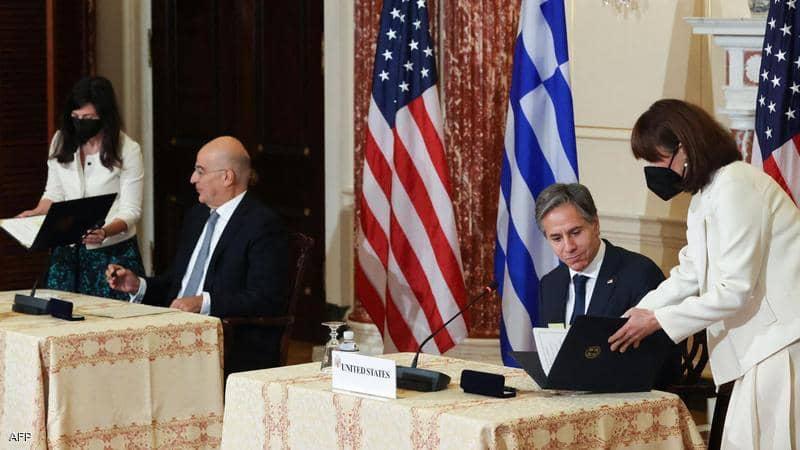Tensions between Ankara and Athens have been escalating, exacerbated by the signing of an additional military agreement between the United States and Greece on October 14th, which allows for the expansion of bilateral defense cooperation between the two countries. The agreement also grants American forces “expanded capabilities” to train and operate four additional military bases in Greece. This defense agreement comes on the heels of signing another defense agreement between Greece and France on September 28th, which allows Greece to buy 3 French-made frigates, with an option to buy a fourth. This coincided with the Biden administration’s tepid response to Turkey’s request to acquire 40 F-16 fighter jets and other military equipment to modernize 80 of its warplanes in October, which stoked Ankara’s concerns that strategic cooperation with Washington is being undermined.
Turkey has signaled that its tensions with Greece in the Eastern Mediterranean are not likely to abate in the near future. The Turkish Ministry of Defense announced, on October 13th, that it is firm in continuing its activities in the region and will publish maps showing the Turkish Neritic Zone and the area covered by the Turkish-Libyan maritime border memorandum, which is considered illegitimate by many parties. The 63rd round of exploratory talks on issues of contention between the two countries, held on October 6th, was unsuccessful in reaching a breakthrough. In this context, provocative Turkish statements have continued, with the AK Party spokesman Omer Celik declaring on October 7th, “The blue homeland is our red line, and it is an integral part of our homeland,” adding that Turkey will “fight for the blue homeland, and we will pay any price.” He called on Greece and Cyprus to “abandon their extremist behavior in the Aegean and the Eastern Mediterranean.” Turkey had issued a warning, on June 24th, declaring the international waters of the Aegean a military training area, which was in response to a prior move by Greece.
On the other hand, Greece has been strengthening its relations with the United States, with its defense agreement with the latter extended in October for a period of five years. Since 1990, the agreement had been renewed on an annual. In addition, last June, the United States Senate Committee on Foreign Relations unanimously approved a bill titled “US-Greece Defense and Interparliamentary Partnership Act of 2021”, which boosts support for Greek military modernization by authorizing new transfers of American military equipment. The bill also refers to increased multilateral engagement between Cyprus, Greece, Israel, and the United States, and allows for the urgent delivery of any future F-35 aircraft and prioritizes the delivery of additional defense items to Greece.
In fact, Greece’s orientation towards strengthening military and political cooperation with Washington is inseparable from its need to mobilize international powers to confront Turkey in the Eastern Mediterranean. Strengthening the partnership with Washington will also allow for a safe working environment for American companies working in Greece in the field of exploration for energy deposits around the coasts of Cyprus and Greece.
Ankara’s Concerns
There are many factors that are raising Ankara’s concerns regarding the new defense cooperation between Athens and Washington, including:
The enhancement of Greece’s military capabilities: Ankara fears Greece’s improved military capabilities, especially after signing a contract to purchase naval and air equipment with Paris at the end of last September. Turkey is also aware that its attempts to acquire American F16 planes, which remains in doubt, may not allow it to keep pace with Greece’s successive deals to obtain French Rafale planes and its efforts to acquire American F-35 planes.
Turkey’s failure to obtain the Sukhoi 57 aircraft from the Russians, the continuation of US sanctions on the Turkish defense authority, and the expulsion of Ankara from the F35 production program due to its acquisition of the Russian S40 missile defense system, all add to Turkey’s concerns.
Turkey views Greece’s defense cooperation with Washington, and the deal with Paris, as a direct threat to its security and interests in the Mediterranean. These agreements will serve to increase Greek defensive and offensive military capabilities, adding pressure on Turkey, while its economic crisis complicates its efforts to balance Greece’s new armament capabilities.
Increasing US pressure: Turkey fears that the new defense cooperation between Athens and Washington will allow the US to exert more pressure on Turkey with respect to issues of contention. These include US support of Greek exploration in the Eastern Mediterranean and the Aegean Sea, as well as Washington’s support of the Syrian Democratic Forces in Northern Syria. Tensions have steadily escalated between the US and Turkey, as reflected in President Recep Tayyip Erdogan’s statements on September 23rd, when he accused the Biden administration of supporting terrorism by transferring weapons, ammunition, and equipment to terrorist organizations in Syria. He also held Washington responsible for the situation in Afghanistan.
Washington appears to be sending a message to Turkey, through strengthening defense cooperation with Athens, that its adoption of policies that contradict US interests may lead Washington to further its cooperation with Turkey’s rivals in the eastern Mediterranean, especially Cyprus and Greece.
Curtailing Turkish activity in the Eastern Mediterranean: Turkey fears the defense cooperation between Athens and Washington will curtail its presence in the Eastern Mediterranean, and its ability to explore for energy deposits there. The US and European powers also support Greece in its long dispute with Turkey over the sovereignty of the island of Cyprus. The US made that clear with its condemnation in July of the project announced by Turkish President Recep Tayyip Erdogan to reopen the Varosha coast, in Northern Cyprus. According to US Secretary of State, Anthony Blinken, the US considers the actions of the Turkish Cypriots in Varosha, to be provocative, unacceptable, and inconsistent with the commitments they made in the past to participate in a constructive manner in peace talks.
In conclusion, it can be argued that US-Greek military cooperation represents, in essence, a new method of applying pressure on Ankara to change policies that are in contradiction with US interests, in the eastern Mediterranean, and elsewhere in the region. Ankara worries that these pressures will have a negative impact on its regional standing, despite its efforts to improve relations with a significant number of regional adversaries.


